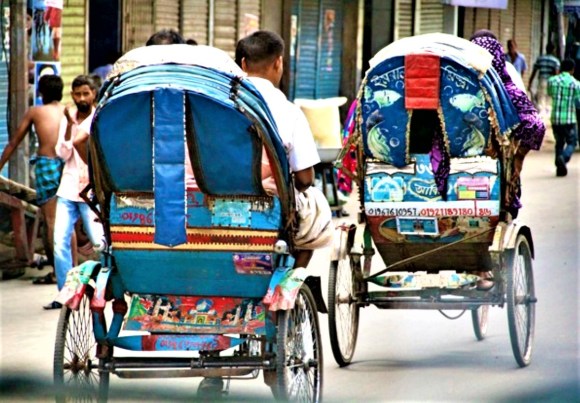Shuvo shokal from Dhaka,
Let me take you by the hand and lead you through the streets of Dhaka. Let me introduce you to two non-fictional cases of humanity that have something in common with each other.
There’s a young boy – perhaps 16, perhaps older – who has been placed on the pedestrian overpass, with a dish for monetary donations. I’ll call him Tahmid, which is a fairly common name here. Tahmid is immobile on account of his debilitating congenital abnormalities. Linda and I pass Tahmid every morning and every afternoon on our way to and from work. He is ultimately there for a period of perhaps ten days. (This is continuous, mind you.)
Tahmid is not the only beggar in Dhaka, and perhaps not even the neediest but there’s something about his circumstance which evokes strong emotions. For me, these emotions are pity and anger in equal proportions. We drop some notes into his dish on most days, wondering where they go.
Tahmid can’t communicate other than by a wan smile. He revels in every moment of human contact, and it’s apparent that he has many other visitors looking to help his piteous cause. It becomes obvious that Tahmid is looked after by someone who periodically collects the money – and hopefully feeds him and attends to his other needs somehow.

Linda and I have different reactions to the wrenching scene. Linda knows the priceless value of human contact and lingers every time with some comfort, including some warm paratha or a banana. She’s bereft really, wishing she could do more and longing for someone to point out just how. I can’t tarry because I know I’d get angry and the cause of the anger is not there for suitable ventilation.
After about ten days, Tahmid is gone from the overpass but neither of us can forget the pathetic scene.
The street vendors are just a solitary notch above. There are thousands of them who eke out a meagre living on footpaths, intersections, any tiny gap where they’re allowed to stay. These are not enterprising business people exploiting a gap in the market; they’re desperate humans trying to feed their families. They are paid a salary (as they call it) from someone who owns their stock. They receive a proportion of sales.
Muhib sells peanuts at the gate to our neighbourhood and smiles cheerfully every day as we step through the hole in the wall. He has three young children and has a tray of produce which would amount to about five kilograms of peanuts. Even if he sold the entire load in a day, he’d be taking in about 500 taka. Remembering, Muhib has to give his boss the lion’s share of the takings, and converting the exchange rate for comparison, Muhib would get a few dollars on a good day.
I ask Muhib (through interpreters) what kind of things would he sell if he had a chance to set up his ideal business. He has no confidence to sell anything but what he knows best: peanuts!

What do Tahmid and Muhib have in common? They are under the thrall of another who controls their existence. What kind of human does that to their fellow human? What kind of bastard perceives another human as nothing more than a source of revenue? They have their charges so dependent on them, they are boxed in. Tahmid and Muhib are inextricably reliant on their sponsors. They know that without these sponsors, they are dead, so they carry on. Neither of them has a chance of improving their position.
These dispiriting Dickensian scenarios are played out in the streets of Dhaka. Many people have fled the rural sectors where their options have been reduced to nil. In the city, where many of these refugees crowd together in slums on the periphery, they have been reduced to some primal means of survival. It’s a persuasive case for the welfare state.
On the other side of the city, a nine-year old has a birthday commemoration. The theme is Formula One. The three-tiered cake and signage are the backdrop to the sumptuous (decadent) feast which surrounds the occasion. Linda estimated that the party could have fed a few thousand. Out on the street, Tahmid sleeps on the overpass under a holey blanket with an occasional banana to eat. Muhib smiles when his three sons take what they get at the end of a bleak day when their father sold nothing.
How can you tell me you’re lonely and say for you that the sun don’t shine?
Let me take you by the hand and lead you through the streets of Dhaka.
Greg
Post Script: after Linda’s telephone intervention Tahmid is rescued by LEEDO.
Other photos from hereabouts



